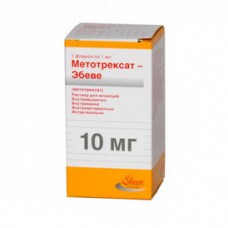Expiration date: 07/2027
Composition
active substance: methotrexate,
1 ml solution contains 10 mg methotrexate,
excipients: sodium chloride, sodium hydroxide, water for injection.
Dosage form
Solution for injection.
Basic physical and chemical properties: clear yellow solution.
Pharmacotherapeutic group
Antineoplastic agents. Antimetabolites. Structural analogues of folic acid.
ATC code L01B A01.
Pharmacological properties
Pharmacodynamics. Anti-rheumatic drug for the treatment of chronic, inflammatory rheumatic diseases and polyarthritis forms of juvenile idiopathic arthritis.
Methotrexate is an antagonist of folic acid as antimetabolite belongs to the class of cytotoxic substances. It acts by competitively inhibiting the enzyme dihydrofolate reductase, thereby inhibiting DNA synthesis. There is still no clear evidence as to whether the efficacy of methotrexate in the treatment of psoriasis, psoriatic arthritis and chronic polyarthritis is associated with an anti-inflammatory or immunosuppressive effect, as well as how extracellular adenosine concentrations contribute to these effects.
Pharmacokinetics. Approximately 50 % of methotrexate is bound in serum to plasma proteins. After distribution, methotrexate accumulates mainly in the liver, kidneys and spleen in the form of polyglutamates, which can persist for weeks and months. When used in low doses in the cerebrospinal fluid penetrates the minimum amount of methotrexate. The final half-life is on average 6-7 hours and depending on the dose and condition of the patient can vary significantly (3-17 hours). In patients with a third distribution chamber (pleural effusion, ascites), the half-life of methotrexate can be up to 4 times longer.
Approximately 10 % of the dose of methotrexate is metabolized in the liver. The main metabolite is 7-hydroxymethotrexate.
Excretion occurs mainly in unchanged form, mainly by the kidneys by glomerular filtration and active tubular secretion in the proximal tubules.
Approximately 5-20% of methotrexate and 1-5 % 7-hydroxymethotrexate excreted in the bile. There is a well-expressed enterohepatic circulation.
In patients with impaired renal function excretion of methotrexate is much slower. It is not known whether liver dysfunction affects the excretion of the drug.
Indications
Methotrexate "Ebewe" is prescribed for the treatment:
- active rheumatoid arthritis in severe form in adults,
- polyarthritis forms of active juvenile idiopathic arthritis in severe form in case of inadequate response to non-steroidal anti-inflammatory drugs (NPLZ),
- psoriasis vulgar generalized in severe form, especially plaque type, and psoriatic arthritis in adult patients in the case of insufficient effectiveness of traditional therapies.



